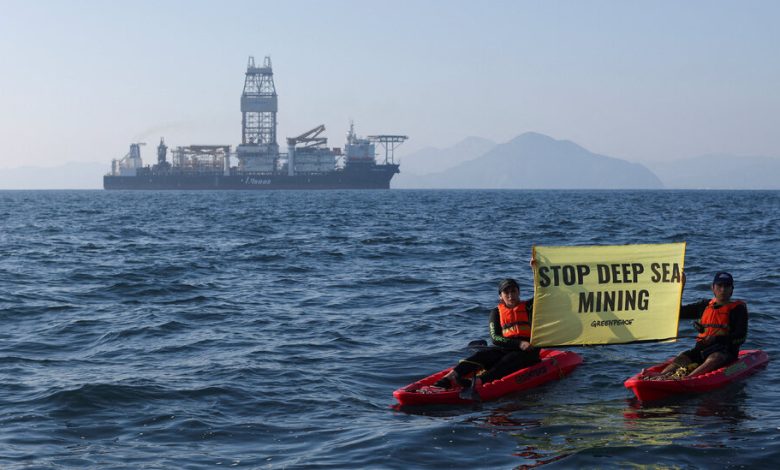Pacific Seabed Mining Delayed as International Agency Finalizes Rules

The start of industrial-scale seabed mining to extract car battery metals from the bottom of the Pacific Ocean has been delayed after the international agency charged with overseeing the work concluded late last week that it needed more time to finalize mining rules.
The action by the International Seabed Authority, which had set a July goal for finalizing seabed mining rules, came after pressure from environmentalists and nations that oppose the effort.
The decision will most directly impact the Metals Company, a Canadian-based mining start-up that has teamed with the small island nation of Nauru to pursue the first license to start industrial-scale mining, perhaps as soon as next year — a timeline that will now be delayed.
Just how long a delay may be is unknown. Maneuvering is underway by both seabed mining opponents, who want to stop the mining entirely, as well as by supporters, who want to figure out how to get it underway by around 2025.
The effort to postpone the start has been led by nations including Costa Rica, Chile and France. The three nations urged other countries that are members of the Seabed Authority’s governing council to agree that no permit authorizing mining in international waters should be granted until regulations are finalized. This will now not likely take place until 2025 at the earliest, the body agreed.
“We are on the side of the ocean,” said Gina Guillén Grillo, Costa Rica’s representative to the Seabed Authority who has helped lead the opposition to seabed mining. “We know there is not enough science. To start right now would be a disaster.”
Gerard Barron, the Metals Company’s chief executive, said he remained optimistic that his company and its partner, Nauru, would secure the approval they needed to start the effort within the next several years.
While the Seabed Authority continues its work to determine environmental standards, as well as a royalty rate that will be paid by the mining contractors, among other matters, the Metals Company will continue to lobby other nations, Mr. Barron said. The company will aim to convince them that ocean floor mining is better for the environment than surface mining in places like Indonesia or Congo, where battery metals such as nickel, cobalt and copper are now being produced.
“Hopefully, we can keep the timetable on track,” Mr. Barron said.
The Metals Company and Nauru, along with the delegation from China, which also has been aggressively pursuing seabed mining, pushed unsuccessfully at last week’s meeting for the Seabed Authority to set a goal of finalizing the regulations by 2024.
Mr. Barron said that the Metals Company’s investors — which include Allseas Group, a Swiss-based company that specializes in offshore oil pipeline operations, and which is looking for a way to transition to work that can support the electric vehicle industry — remained committed to the project.
As it now stands, the Seabed Authority, which is based in Jamaica, has issued 31 contracts for exploratory work in the Pacific, Indian and Atlantic Oceans. These agreements allow sponsoring nations and their contractors to gather small quantities of seabed rocks or cobalt-rich crusts while assembling data on the environmental impact of the process, such as the risk that plumes of sediment might pose to other aquatic life when the rocks are lifted.
The area of most intense focus is the Clarion-Clipperton Zone, a remote stretch between Mexico and Hawaii where seabed rocks have the highest concentration of metals. The rocks sit 2.5 miles down, so deep that remotely operated machines are needed to lift them to collection ships.
This is the region where the Metals Company wants to begin its mining operations, convinced it can generate $30 billion in post-tax net cash flow over the 25-year life of the initial project. If it is successful, this small company that has never produced a profit would become one of the largest global suppliers of key metals needed for electric vehicle batteries.
One of the biggest questions now is when Nauru will submit an application to begin industrial-scale mining. It may do so before the regulations are finalized, knowing that it will likely take at least a year for the application to be reviewed and then to be acted on by the Seabed Authority.
If Nauru and the Metals Company must wait until the regulations are finalized, seabed mining would begin no sooner than 2026 amid continued opposition.
Environmentalists who have teamed up with nations like Costa Rica and France to challenge seabed mining have said the delay would give them more time to enlist additional countries that want to see a long-term pause or even a moratorium on the practice. Nearly two dozen nations have now endorsed some form of a hold, up from just a handful a year ago.




